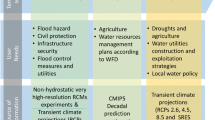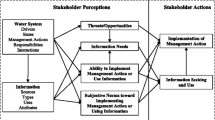Abstract
Despite nearly 20 years of work on understanding the climate information needs of stakeholders and simultaneous development of decision support tools, a relatively low level of awareness of specific climate information products exists among many water managers in the southeastern United States. This paper presents results from an assessment of key water management decisions, awareness of, perception of, use of, and barriers and opportunities for using climate information among water managers in Alabama, Florida, and Georgia. Through an online survey, we collected data from 141 water managers across the region. Our findings reveal that water managers surveyed, for the most part, are unaware of most sources of seasonal climate forecasts as well as specific sources of long-term climate change information. From our analysis, we found that the use of seasonal climate forecast products remains mostly in the realm of water managers with high levels of expertise and training generally employed at large water management agencies. In addition to limited awareness, some reasons for nonuse are lack of understanding of forecasts and limitations in temporal and spatial scales of available climate information. We conclude with recommendations on how our findings can be used to align goals of climate science research by ensuring that it is relevant to decision-makers’ needs and decisions and by identifying opportunities for improvements in forecast dissemination and climate risk management. For example, the need for more interactions among scientists and decision-makers, and the identification of opportunities within the decision-making frameworks where climate information can be input are manifest throughout the study.
Similar content being viewed by others
Notes
The 11 Regional Water Planning Councils were created by the State of Georgia in 2009 and Regional Water Management Plans were adopted in 2011 (http://www.georgiawaterplanning.org/).
References
Andrews D, Nonnecke B, Preece J (2003) Electronic survey methodology: a case study in reaching hard-to-involve internet users. Int J Hum-Comput Int 16:185–210
Bales R, Finan T, Hughes M, Liverman P, Sooroshian S (1997) Variability, social vulnerability and public policy in the Southwestern United States: a proposal for regional assessment activities. Proposal to NOAA-OGP, 15 April 1997
Bernard R (2000) Social research methods: qualitative and quantitative approaches. Sage Publications, Thousand Oaks, p 784
Bolin B, Seetharam M, Pompeii B (2010) Water resources, climate change, and urban vulnerability: a case study of Phoenix, Arizona. Local Environ 15:261–279
Bolson J, Broad K (2012) Early adoption of climate information: lessons learned from South Florida water resource management. WCAS. doi:10.1175/WCAS-D-12-00002
Callahan B, Miles E, Fluharty D (1999) Policy implications of climate forecasts for water resources management in the Pacific Northwest. Policy Sci 32:269–293
Carbone GJ, Dow K (2005) Water resource management and drought forecasts in South Carolina. J Am Water Resour As 41:145–155
Carter RH, Morehouse BJ (2003) Climate and urban water providers in Arizona: an analysis of vulnerability perceptions and climate information use. CLIMAS report series, CL1-03
CPC (2012) National Weather Service Climate Prediction Center outlook maps, graphs, and tables. Available at: http://www.cpc.ncep.noaa.gov/products/predictions/
Dilling L, Lemos MC (2011) Creating usable science: opportunities and constraints for climate knowledge use and their implications for science policy. Glob Environ Change 21 SI 2:680–689
Dillman DA, Smyth JD, Christian LM (2008) Internet, mail, and mixed-mode surveys: the tailored design method. Wiley, NY, p 512
Fanning JL, Trent VP (2009) Water use in Georgia by county for 2005; and water-use trends, 1980–2005: US geological survey scientific investigations. Report 5002:186
Feldman DL, Ingram HM (2009) Making science useful to decision makers: climate forecasts, water management, and knowledge networks. Weather Clim Soc 1:9–21
Fraisse CW, Breuer NE, Zierden D, Bellow JG, Paz J, Cabrera VE, Garcia y Garcia A, Ingram KT, Hatch U, Hoogenboom G, Jones JW, O’Brien JJ (2006) AgClimate: a climate forecast information system for agricultural risk management in the Southeastern USA. Comput Electron Agr 53:13–27
Glantz MH (ed) (1994) Usable science: food security, early warning, and El Niño. In: Proceedings of workshop on ENSO/FEWS, Budapest, Hungary, October 1993, Nairobi and Boulder, Colorado: UNEP
Green PM, Legler DM, Miranda V CJ, O’Brien JJ (1997) The North American climate patterns associated with the El Nino Southern oscillation: center for ocean-atmospheric prediction studies at the Florida State University COAPS project report series 97-1, Tallahassee, FL. Available at: http://coaps.fsu.edu/lib/booklet/
Hanson K, Maul GA (1991) Florida Precipitation and the Pacific El Niño, 1895–1989. Florida sci 54(3):160
Hutson SS, Littlepage TM, Harper MJ, Tinney JO (2009) Estimated use of water in Alabama in 2005: USGS Scientific Investigations. Report 5163:210
IPCC (2007) Intergovernmental panel on climate change fourth assessment report. The physical science basis, working group I report, Geneva, Switzerland. Available at: http://www.ipcc.ch/ipccreports/ar4-wg2.htm
IRI (2012) International Research Institute for Climate and Society. IRI Seasonal Climate Forecasts. Available at: http://portal.iri.columbia.edu/portal/server.pt?open=512&objID=944&PageID=0&cached=true&mode=2&userID=2
Lemos MC (2008) What influences innovation adoption by water managers? Climate information use in Brazil and the United States? J Am Water Resour As 44:1388–1396
Lemos MC, Morehouse B (2005) The Co-Production of science and policy in integrated climate assessments. Global Environ Change 15:57–68
Lowrey J, Ray A, Webb R (2009) Factors influencing the use of climate information by Colorado municipal water managers. Clim Res 40:103–119
Marella RL (2004) Water withdrawals, use, discharge, and trends in Florida, 2000: USGS Scientific Investigations. Report 5151:136
Miles EL, Snover AK, Whitely Binder LC, Sarachik ES, Mote PW, Mantua N (2006) An approach to designing a national climate service. Proc Natl Acad Sci 103:19616–19623
Mote TL (1996) Influence of Enso on maximum, minimum, and mean temperatures in the Southeast United States. Phys Geogr 17(6):497–512
O’Connor RE, Yarnal B, Dow K, Jocoy CL, Carbonne GJ (2005) Feeling at risk matters: water managers and the decision to use forecasts. Risk Anal 5:1265–1275
O’Connor RE, Yarnal B, Neff R, Bord R, Wiefek N, Reenock C, Shudak R, Jocoy CL, Pascale P, Knight CG (1999) Weather and climate extremes, climate change and planning: views of community water system managers in Pennsylvania’s Susquehanna river Basin. J Am Water Resour As 35:1411–1419
Pagano TC, Hartmann HC, Sorooshian S (2002) Factors affecting seasonal forecast use in Arizona water management: a Case study of the 1997–1998 El Niño. Clim Res 21:259–269
Pulwarty RS, Redmond KT (1997) Climate and salmon restoration in the Columbia river basin: the role and usability of seasonal forecasts. B Am Meteorol Soc 78:381–397
Rayner S, Lach D, Ingram H (2005) Weather forecasts are for wimps*: why water resource managers do not use climate forecasts. Climatic Change 69:197–227
Ropelewski CF, Halpert MS (1987) Global and regional scale precipitation pat- terns associated with the El Nino/Southern oscillation. Mon Weather Rev 115:1606–1626
Rosenzweig CR (2008) Climate variability and the global harvest. Oxford University Press, New York
Smith DM, Scaife AA, Kirtman BP (2012) What is the current state of scientific knowledge with regard to seasonal and decadal forecasting? Environ Res Lett 7:1–11
Stefanova L, Misra V, O’Brien JJ, Chassignet EP, Hameed S (2011) Hindcast skill and predictability for precipitation and two-meter air temperature anomalies in global circulation models over the Southeast United States. Clim Dynam 38:161–173
Steinemann AC (2006) Using climate forecasts for drought management. J Appl Meteorol Clim 45:1353–1361
Wang B, Lee JY, Kang I, Shukla J, Park CK et al (2009) Advance and prospectus of seasonal prediction, 2008: assessment of the APCC/CliPAS 14-Model ensemble retrospective seasonal prediction 1980–2004. Climate Dynam 33:93–117
Author information
Authors and Affiliations
Corresponding author
Rights and permissions
About this article
Cite this article
Bolson, J., Martinez, C., Breuer, N. et al. Climate information use among southeast US water managers: beyond barriers and toward opportunities. Reg Environ Change 13 (Suppl 1), 141–151 (2013). https://doi.org/10.1007/s10113-013-0463-1
Received:
Accepted:
Published:
Issue Date:
DOI: https://doi.org/10.1007/s10113-013-0463-1




